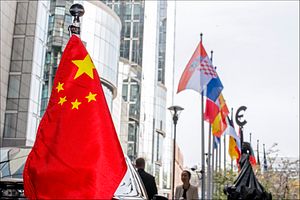Trans-Pacific View author Mercy Kuo regularly engages subject-matter experts, policy practitioners, and strategic thinkers across the globe for their diverse insights into U.S. Asia policy. This conversation with Dr. Sandra Marco Colino – associate professor and deputy director of the Center for Financial Regulation and Economic Development (CFRED) at Chinese University of Hong Kong, managing editor of the China Antitrust Law Journal, and author of law textbook Competition Law of the EU and UK (Oxford University Press) – explores the European Union’s stance on the Hong Kong protests.
Explain the legal rationale behind the European Parliament’s vote in July on a resolution calling for Hong Kong to withdraw its extradition bill.
The European Parliament often adopts resolutions on issues relating to both EU member states and non-EU countries. They are not binding, and the only effect they may bear is to exert political pressure. In the case of the resolution relating to Hong Kong, various political parties represented in the European Parliament are seemingly worried by the developments that are taking place this summer in the city. The intention of the resolution would thus be to state a joint position and put forward some suggestions for resolving the controversy.
What is the strategic messaging of the European Parliament’s resolution?
The resolution attempts to emphasize the importance of the rule of law and the respect of the “one country, two systems” principle. The Hong Kong government is urged to confirm the withdrawal of the Extradition Bill, to investigate whether the use of police force was excessive, and to release the protesters that have been detained. More importantly, the resolution asks the European Commission and the European External Action Service (EEAS) to monitor the situation in Hong Kong and to “halt all export of crowd control equipment and ‘non-lethal’ weaponry” that could be used against protesters. While the European institutions are not obliged to follow these suggestions, they often give serious consideration to the European Parliament’s proposals, and may decide to take action on the basis of the recommendations put forward.
How might Beijing’s swift condemnation of this resolution impact EU-Hong Kong relations, considering the EU is Hong Kong’s second largest trading partner?
Beijing’s reaction is perhaps a reflection of the desired political pressure that motivated the adoption of the resolution in the first place. There have been similar condemnations in the past from Turkey, and even some EU member states, such as Poland or Hungary, when they have been on the receiving end of the European Parliament’s measures. For example, the Hungarian parliament itself adopted a resolution condemning the position of the European Parliament, which had criticized the Hungarian government’s lack of respect for academic freedom and freedom of speech. It is possible that the resolution has an impact on trade relations not just with Hong Kong, but also with China.
What is the impact of the Parliament’s resolution on EU diplomacy and foreign policy?
The resolutions can indeed sometimes raise diplomatic tensions. They are normally resolved through dialogue. The country to which the resolution is addressed may attempt to explain its position and get at least some support or understanding to avoid tensions building up. However, it looks unlikely that Hong Kong or China will act on the views of the European Parliament.
In the broader geopolitical context, how might this EU vote impact transatlantic relations vis-à-vis China?
China is the EU’s second biggest trading partner, and the EU is China’s biggest trading partner. As a result, any measures adopted could have considerable consequences. But that of course would require that the European institutions and/or its member states indeed decide to act on the basis of the resolution. They have no obligation to do so.

































